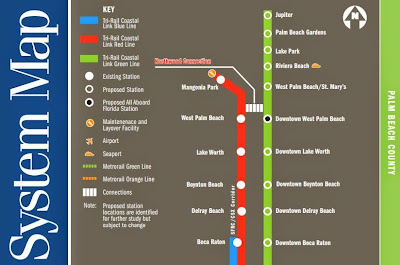 |
| Image from the article by Joseph Stromberg. |
For people who are constantly stuck in traffic jams during their commutes, there seems to be an obvious solution: just widen the roads.UPDATE: A kind reader of my blog left a comment about All Aboard Florida (AAF) not helping smaller cities between the larger cities of Miami, Ft. Lauderdale, West Palm Beach and Orlando. What is proposed after AAF is completed is what's called the Coastal Link. Here is what the Coastal Link will look like in Palm Beach County:
This makes intuitive sense. [emphasis added] Building new lanes (or new highways entirely) adds capacity to road systems. And traffic, at its root, is a volume problem — there are too many cars trying to use not enough road.
But there's a fundamental problem with this idea. Decades of traffic data across the United States shows that adding new road capacity doesn't actually improve congestion. The latest example of this is the widening of Los Angeles' I-405 freeway, which was completed last May after five years of construction and a cost of over $1 billion. "The data shows that traffic is moving slightly slower now on 405 than before the widening," says Matthew Turner, a Brown University economist.
The main reason, Turner has found, is simple — adding road capacity spurs people to drive more miles, either by taking more trips by car or taking longer trips than they otherwise would have. He and University of Pennsylvania economist Gilles Duranton call this the "fundamental rule" of road congestion: adding road capacity just increases the total number of miles traveled by all vehicles.
NBC5/WPTV's Brian Entin did a top-notch news segment on the Coastal Link.










![Dr. W. H. Cotton’s ode: “Oh, My Lake Worth, Florida!” [circa 1920].](https://blogger.googleusercontent.com/img/b/R29vZ2xl/AVvXsEjUL75cv6zJQFjX15ojOIIz9AjnbqH4asHJTYSDhnGnYr7rJZRha1NcNTirj2xPcId158vkz5Hw-wXgOfrlztj8Zr8jLFFCfuEN6PyV44ZlpMRmJ68xbtFL9vzxNiG7xDs_HJvm/s1600/LakeWorthPioneers.JPG)





